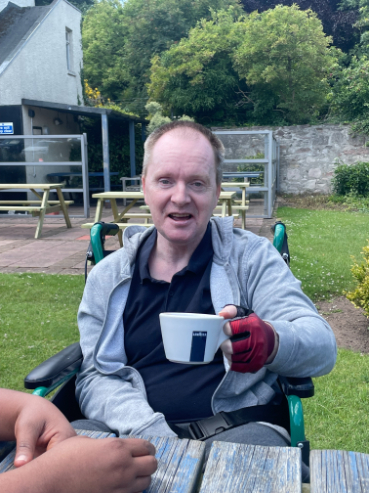
What Is Neurological Rehabilitation and Why Does It Matter in Care Homes
Neurorehabilitation (also known as neurological rehabilitation or brain rehabilitation) is a compassionate, multidisciplinary process that supports people recovering from damage or disease affecting the nervous system. Whether due to a stroke, spinal cord injury, brain trauma, neurological condition or illnesses, this specialist care aims to help individuals regain function, maximise ability and independence, rebuild confidence and adapt to a meaningful new normal. As part of the assessment process, a diagnosis is made to guide the rehabilitation plan. Neurorehabilitation isn’t just done to someone, it’s done with them, guided by their goals and supported by a team of experts including neurologists, physical therapists, occupational therapists, speech and language therapists, nurses, psychologists and more.
Neurological conditions can cause disability and affect different parts of the body, impacting movement, sensation and function. The team plays a crucial role in identifying and addressing problems, such as behavioural or psychiatric issues, that may hinder rehabilitation.
In a residential care home setting that includes a neuro rehabilitation unit (often referred to as a neurorehab or neurological rehabilitation unit), this service is provided every day. The multidisciplinary team works together to treat neurological conditions and support complex needs. Residents benefit from a coordinated neurological care pathway, where active therapy, multidisciplinary involvement and personalised support are woven into daily routines. Specialist staff such as a neurological therapist or neuro therapist helps to assess progress, review care plans and adjust therapy strategies so recovery remains both safe and progressive, with a focus on what matters to the individual for recovery.
Neurotherapy and Rehabilitation in a Specialist Unit
Within a neurorehab setting, neurotherapy and neurological rehabilitation is structured around personalised programmes that address movement, communication, cognition and emotional wellbeing. Rehab exercises such as, brain rehabilitation activities and structured workouts are part of everyday life. Using techniques like constraint-induced movement therapy or the Bobath approach, therapists work closely with residents to promote motor learning, improve posture and reduce abnormal muscle tone.
These rehabilitation exercises might include guided walking, balance training, strengthening tasks, hand dexterity activities, coordination drills and activities of daily living such as dressing. Every session is tailored to a resident’s goals and tolerance. While some therapies focus on physical movement, others, such as speech therapy, swallowing support and cognitive rehabilitation, address everyday skills and communication. With neurologic rehabilitation, the aim is to rebuild independence and wellbeing.
How a Neuro Rehabilitation Unit Fits into a Care Pathway
When someone moves from hospital or home into a neurorehabilitation unit, they enter the next phase of the care pathway. Patients are typically referred to the neurorehabilitation service through a formal referral process, which may involve healthcare professionals from hospital departments or community teams. This transition is carefully managed so that clinical assessments, therapy goals and emotional care continue seamlessly. The neurorehabilitation unit is located within a specialist care home setting, providing dedicated facilities for ongoing treatment and assessment. Families and residents receive a Rehabilitation Prescription or personalised plan that outlines milestones, expected therapies and frequency of support. These pathways ensure continuity from acute home care to specialist care home environments that deliver intensive therapy.
In the supportive environment of a neurorehab care home, neurological care plans align with rehabilitation guidelines and frameworks. Therapy goals, neurorehabilitation physiotherapy, nurse-led mobility support, meal plans, psychological care and assistive technology are reviewed at regular team meetings, often every few weeks to reflect evolving needs. Residents engage not just in therapy but in community activities, social interaction and structured daily life that respects their dignity, promotes recovery and keeps independence as a central aim.
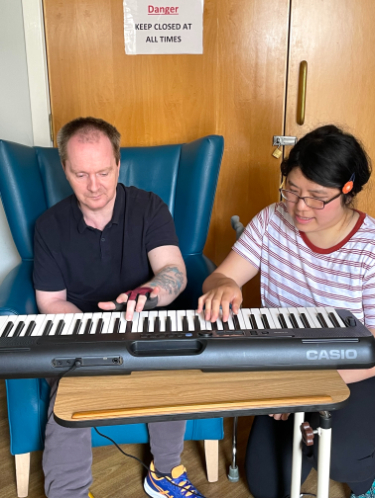
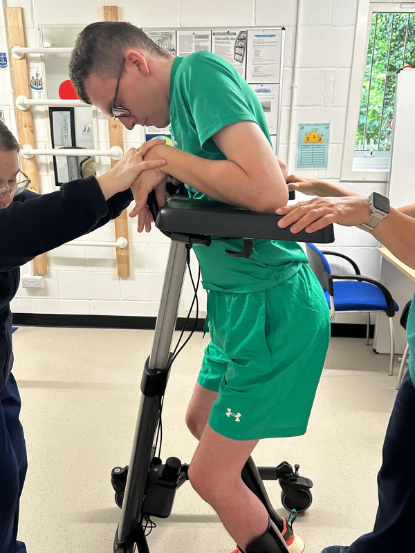
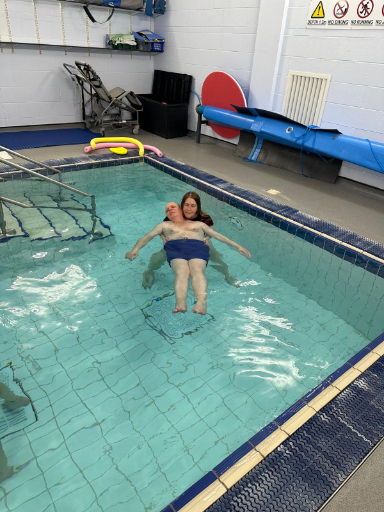
The Role of Specialist Staff: Neuro Therapists, Neurological Therapists and Nurses
In specialist settings, terminology varies, some refer to a neurotherapist, others to a neurological therapist or general physiotherapist, but all play a vital role in neurological rehabilitation. The multidisciplinary team includes key members such as the occupational therapist, psychologist and speech therapist, who work alongside neurology care teams, neuro nurses, consultants and support staff. These professionals lead therapy sessions, create and adapt rehabilitation programmes and manage a wide range of neurological conditions. Combined with skilled nursing care, this approach allows residents to work toward goals such as walking again, improving swallow safety, refining speech, relearning life skills and managing pain through integrated therapy and nursing interventions.
Nursing is at the centre of neurological rehabilitation. Registered nurses oversee medication regimes, support mobility safely, monitor skin integrity and swallowing and coordinate with therapists to reinforce care plans. They ensure the therapy carried out by therapists integrates into safe daily routines, support mealtimes, rest periods and evening care, all within a warm, homely environment.
The Rehabilitation Process: What to Expect
When a patient is referred to a neurorehabilitation unit, the journey begins with a thorough and holistic assessment by a dedicated rehabilitation team. This team typically includes occupational therapists, physiotherapists, speech and language therapists and consultant neurologists, all working together to understand the individual’s unique needs, abilities and goals. The initial assessment covers everything from mobility and communication to daily living skills and emotional wellbeing, ensuring that every aspect of life is considered.
Based on this assessment, the team develops a personalised treatment plan designed to maximise function and independence. For example, someone living with spinal cord injuries may benefit from intensive physiotherapy to improve mobility and regain strength, while those with multiple sclerosis might work closely with occupational therapists to adapt everyday activities and maintain independence at home and in the community. Speech and language therapists provide targeted language therapy to support communication and swallowing, while practical support and advice are offered to help manage symptoms and access community services.
Throughout the rehabilitation process, patients and their families are supported every step of the way. The team provides ongoing guidance, reviews progress regularly and adapts therapies as needs change. This collaborative approach ensures that each individual receives the right range of therapies and services to improve their quality of life, manage symptoms and achieve their personal goals.
Whether it’s learning new ways to get dressed, improving speech or building confidence in mobility, the neurological rehabilitation team is there to help individuals work towards greater independence and a more fulfilling life.
Overcoming Challenges in Neurorehabilitation
Neurorehabilitation is a journey that often comes with unique challenges, as every patient’s experience with a neurological condition is different. The rehabilitation team understands that individuals with acquired brain injury, stroke or spinal cord injuries may face a wide range of physical, cognitive and emotional impairments. For example, someone recovering from a brain injury may need specialised support to manage memory loss or changes in thinking skills, while another individual with a spinal cord injury might require intensive physiotherapy to regain mobility and adapt to new ways of moving.
The rehabilitation process is not just about treating symptoms, it’s about empowering individuals to overcome obstacles, regain independence and participate fully in life. By providing a comprehensive range of services and ongoing advice, the team helps patients and their families navigate the complexities of neurological conditions. With patience, collaboration and a focus on individual goals, neurorehabilitation teams make a meaningful difference, helping people manage challenges, celebrate progress and work towards a brighter, more independent future.
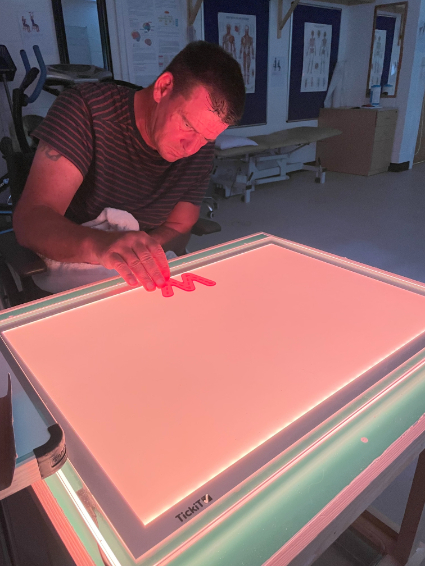

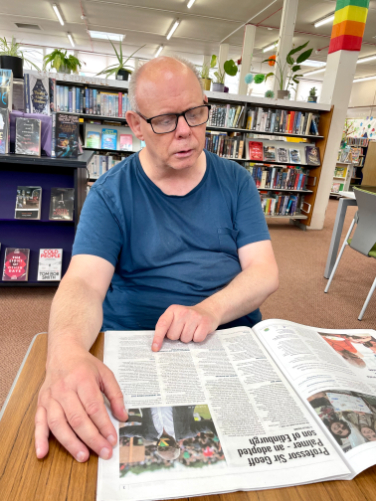
Why Neurorehabilitation Matters
True neuro rehabilitation, at its core, is about rebuilding life. It’s not only physical recovery, but cognitive restoration, emotional support and adapted living spaces. From virtual reality therapy to robotics-supported exercise, art or music therapy, to hydrotherapy and cognitive retraining, a thoughtful neurorehabilitation unit offers tools for recovery.
For many individuals, beginning neurorehabilitation can happen months or even years after an event. New neurological therapies may still bring meaningful progress thanks to neuroplasticity. The environment of a specialist home or neuro rehabilitation unit offers continuity, structure and motivation to support that recovery journey at every stage, and such neurorehabilitation services are available across the UK.
Frequently Asked Questions
What is neurorehabilitation?
It’s a structured, holistic programme of neurological and physiotherapy, occupational therapy, speech therapy, nursing care and psychological support designed to restore function and quality of life after a neurological injury or condition.
Who works in a neurorehab unit?
A diverse team of neurologists, neuro therapists, physiotherapists, occupational therapists, speech-language therapists, nurses, dietitians, psychologists and more collaborate to deliver personalised care plans for each resident.
How does neurorehab in a care unit differ from therapy at home?
At home, support may be fragmented or limited. In a specialist unit, residents access intensive, multidisciplinary neuro rehabilitation every day, alongside 24/7 nursing oversight. This ensures therapy is consistent, safety is maintained and recovery goals are actively pursued.
In Summary
Whether it’s called neurologic rehabilitation, neurorehab or a neuro rehabilitation unit, specialised care provides a structured environment where tailored therapy, compassionate nursing, and clinical oversight support recovery across physical, cognitive and emotional domains. From embracing brain rehabilitation to following care pathways shaped by NHS guidance, this model gives individuals the best opportunity to live well, regain skills and feel valued each day.
Speak to our expert and passionate team about Neuro Rehabilitation at Gilmerton Neurological Centre.
Click here to arrange your home tour.
